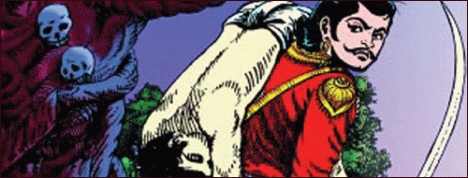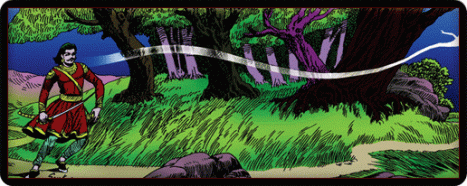
The Damsel And The Sea
Long ago, a great king Vikramaditya ruled a prosperous kingdom from his capital Ujjain. He had immense love for learning and adventure.
King Vikram rewarded the virtuous, punished the evil-doers and encouraged scholars, poets, musicians and artists. Many people came to meet him and they brought him gifts of jewels, gold or other precious things. Among such visitors was a mendicant who on every visit presented the king with a fruit. The king handed over the fruit to the royal storekeeper.
One morning, the mendicant gave him his usual gift and the king accepted the fruit and went out playing with it. While playing with it, the fruit fell down. Instantly a monkey swooped down upon it and tried to crack it with his teeth. The fruit popped open and out came a ruby. The king was surprised. He picked up the ruby and sent for an expert to examine it. After examination, the ruby was rated as the finest ruby ever seen. The king asked the storekeeper to get all the fruits presented by the mendicant. He found a ruby in each one of those fruits and was amazed.
“O king, I wish a favour from you. But I can only tell you about it in private,” replied the mendicant.
The king led him to the private audience chamber. The mendicant then said, “I know how brave you are. Hence I wish you do something for me that requires courage. But, for that, you must meet me under a banyan tree in the middle of the cremation ground beyond the city, at night, on the 14th day of the dark half of the month.”
Vikram hesitated for a while. But the spirit of adventure got the better of him. He decided to meet the mendicant at the appointed hour. It was a dark night. A terrible gale was blowing. When Vikram reached the cremation ground, he heard the howling of foxes and jackals. Ghouls and ghosts stared at him and danced. Vikram reached the banyan tree and met the mendicant.
Getting a corpse that hung on a distant tree on that stormy night was not an easy task. But King Vikram managed to reach the old tree. Raising a burning torch he found the hanging corpse. He climbed the tree and by a stroke of his sword cut the rope with which the corpse was tied to the branch. The corpse fell on the ground, but gave out an eerie cry.
Vikram, unaware that the corpse was possessed by a spirit, thought it was alive. He came down and lifted the sprawling body. The corpse began to laugh. Surprised, the king asked, “Why do you laugh?”
When the king opened his mouth the corpse slipped away and hung on the tree again. This happened over six times and then he realised that his talking was the reason for the corpse to slip away.
The seventh time, Vikram put the corpse on his shoulder and began walking quietly. He took a few steps when the corpse, which was a vampire, said, “O King, tiresome is the way. Let me tell you a tale to keep you amused.” He began the tale.
Long ago Yasaketu ruled the kingdom of Anga. He led a lavish life and left the affairs of the state to his minister. Luckily, his minister was an extremely honest man and governed the kingdom well. But the other officers were jealous of him and spread rumours that he was a corrupt.
The disheartened minister asked his wife for advice. “Leave the country for a few months. Either the officers will realise your value or the king will come back to his senses. Whatever happens will be good for you,” she said.
The minister was convinced. He went to the king and said, “O King, I am going on a pilgrimage. Please do not neglect to discharge your duty during my absence.”
“There is no use going on a pilgrimage,” shouted the king.
The minister replied, “I must go when I have the strength to travel. I can’t go when I am old.”
The King didn’t say anything and plunged back into merrymaking.
The minister started travelling. He reached a harbour where he met an old merchant friend. The merchant was about to travel to an island and was happy to accommodate the minister. They reached the island. After the merchant finished his business they began their journey back home.
It was a moonlit night. The merchant and the minister were strolling on the ship’s deck when the water whirled before them and a bejewelled tree rose from the waves. They saw a beautiful damsel sitting on the tree and playing a veena.
King Yasaketu was worried about the minister’s absence. When he was informed by the spies that the minister was approaching the capital, he welcomed him and asked, “Tell me, where did you go and what all did you see?”
The minister narrated his experience including the damsel he had seen. The king was thrilled to hear of the strange sight and exclaimed, “My dear minister, take charge of the kingdom, I am off in search of the lady.”
The king plunged into the sea where he found a magnificent palace. He entered it and saw the damsel resting on an ivory cot. The doe-eyed damsel asked, “Who are you? What brings you here?”
“I am Yasaketu, the king of Anga. I have risked my life and come here to meet you,” answered Yasaketu. He asked, “But will you please tell me who you are?”
”I am Mrigankavati, a nymph. My father left me here. Once in a while I can rise above the water seated on a magical tree,” answered the nymph.
They enjoyed each other’s company. As days passed, the king requested the nymph to marry him.
The nymph agreed but on a condition that every month on four different days she would go away from the house and shouldn’t be questioned about it. The king agreed and they got married.
They lived happily for a year. One day, while the nymph was on her mysterious mission, the nymph said, “Be cheerful, I will be back soon. Remember not to jump into the well in the corner of the house. If you do, you will find yourself in your kingdom!”
“Is this a dream?” asked the baffled king. “No, it isn’t. Let me tell you a story. I used to attend to my father faithfully. But on four auspicious days of the month I went to worship goddess Durga and neglected my father. My father was displeased and cursed me, as a result of which a demon swallowed me on those four days. He would vomit me at the end of the day. My father assured me that if the demon was killed, I would be free from the curse. You just did that. I am free now, a full-fledged nymph with supernatural powers. But the sad fact is that a man and a nymph cannot live as husband and wife. I must go back to my father and you must return to your kingdom.”
The king was disheartened when he heard the words of the nymph. He requested the nymph to stay with him for another week and she agreed. At the end of the week, the king stood near the well to jump into it. The nymph sobbed inconsolably. Suddenly, the king held her hand and jumped into the well. They both landed in Yasaketu’s palace. Once on earth, the nymph became a human being.
The news of the king’s arrival spread and people flocked to the palace to meet him. The minister too arrived. As soon as he saw the damsel, he collapsed and died.
The vampire finished the story and asked King Vikram, “Tell me, O King, why do you think the minister died? Was it because he was going to lose authority now that the king was back? Or was it because he had a secret desire to marry the nymph and was disappointed to see that the king had married her?
If you know the right answer and yet choose to keep quiet, your head will be shattered to pieces!”

Answered King Vikram, “None of these was the cause of the minister’s death. As it is, the king neglected his duty and the poor minister had to bear the burden of administration and also the rumours spread about him. With a beautiful queen, the minister knew the king would never find time for the kingdom. The minister’s agony will never come to an end. It was this thought that killed him.”
As soon as King Vikram spoke, the vampire slipped off his shoulder and hung on the tree.
